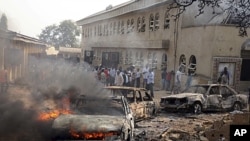The Nigerian Islamist group Boko Haram has again demonstrated its capacity to inflict fear and terror on the people of Nigeria, with a series of bomb attacks that killed at least 39 people this past weekend. Analysts suspect the group also is working with other terrorist organizations in Africa, but it is not clear to what degree.
Boko Haram, which means “Western education is sinful,” has developed its own distinct brand of terror in Nigeria by carrying out acts of violence in crowds, seeking to inflict as much bloodshed and damage as possible.
The group has typically gone after domestic targets, including Nigerian police and government institutions, in what is believed to be an effort to create a Sharia-ruled state. But that all changed with a major suicide bomb attack on a United Nations building this year in the capital Abuja.
The strike against the U.N. raised suspicion that Boko Haram, which has a stated Islamist agenda, is now operating on a larger scale, and strengthened the idea that it may have direct ties to al-Qaida.
Greg Barton is director of the Center for Islam and the Modern World at Monash University in Australia. “Over the years they've changed their philosophy to focus on a more familiar jihadi world view that wants change in the country and sees itself as part of a global struggle. And they've made links with al-Shabab in Somalia and with al-Qaida in the Islamic Maghreb in Algeria, which is very worrying," he explained. "So they've broadened their list of aims and it means it's almost impossible to negotiate with them.”
The top officer in the U.S. military's Africa Command, General Carter Ham, has expressed concern about Boko Haram's claim to be receiving support from other al-Qaida linked groups in the region.
General Ham told a group of defense writers in September that he is especially concerned with the stated intent of these groups to work together. He said that intent has been “voiced most clearly” between al-Qaida in the Islamic Maghreb, or AQIM, and Boko Haram.
Last year (2010) AQIM publicly announced it would support Boko Haram with weapons and training. But the two groups have used different tactics. Operating in Mali, Niger and Algeria, AQIM is notorious for kidnappings - mostly of European workers and tourists - in alleged retaliation for foreign commercial exploitation of North Africa.
On the other side of the continent, there is also evidence of a relationship between Boko Haram and Somalia's militant faction al-Shabab.
Abdi Samad, a security analyst with Southlink Consultants, says he witnessed the link firsthand during a visit to Somalia in 2008, when he saw a Nigerian man leading an al-Shabab operation to excavate the graves of Sufi sheikhs in the Lower Shabelle region.
“I have no doubt whatsoever there is a link between Boko Haram and al-Shabab, because when I heard Boko Haram - what they're doing in Nigeria - I vividly remember, my memory goes back to 2008, when I saw that tall guy, Nigerian, who was in charge of such operations. So I have a strong suspicion about the Boko Haram they have a link with al-Shabab," Samad said. "But, [to] what extent, that's the question. I don't know it, to be honest. I don't know it.”
Nigerian security officials have also said that the man responsible for bombing of the U.N. building in Abuja, Mamman Nur, planned the attack after returning from a trip to Somalia.
Samad says the big question about Boko Haram is whether they are interested in a global jihadist philosophy, which would put the group more in tune with members of al-Shabab.
“The difference between the Boko Haram, al-Shabab they are saying, there are some elements who advocate what they call global jihad, they are going to spread Islam from China to Chile, from Cape Town to Canada, which means they are going to [assimilate] the entire world. That's what you call the ideology of al-Shabab - sorry, a section of al-Shabab -- but I'm not sure if that one they share with Boko Haram,” Samad stated.
The African Union commission on counter-terrorism presented a report earlier this month outlining the AU's efforts to confront regional threats.
The only group aside from the three al-Qaida linked terror organizations listed in the report was the Lord's Resistance Army, which operates in Central Africa.
The report called for a more coordinated effort to confront the groups saying their activities represent “alarming signals of the level of threat facing the continent.”
Boko Haram Seen Linked to Other African Terror Groups




